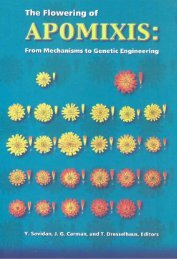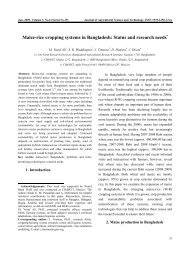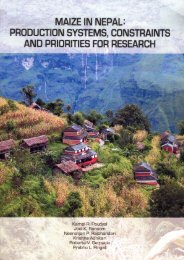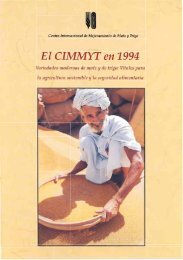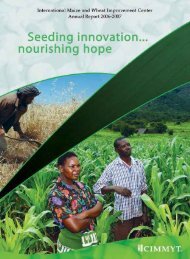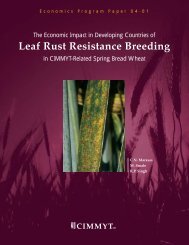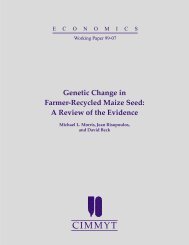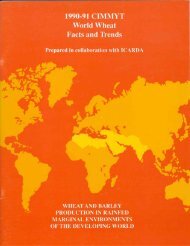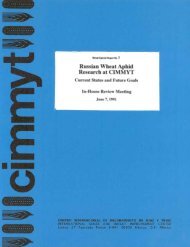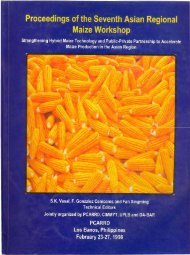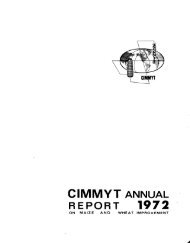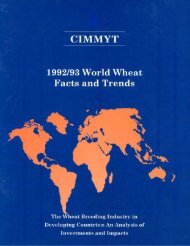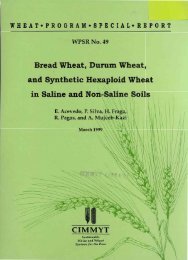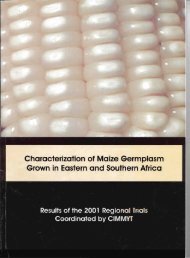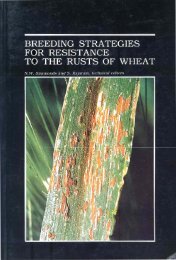Download - Maize
Download - Maize
Download - Maize
Create successful ePaper yourself
Turn your PDF publications into a flip-book with our unique Google optimized e-Paper software.
While men are often regarded as household heads and the primary providers for families, women in<br />
many maize‐based systems in Africa, Asia, and Latin America invariably contribute a major proportion of<br />
the labor in planting, weeding, harvesting, and processing as well as adopting the role of the primary<br />
caregiver for the family. Women often work longer hours than men and have much less access to land,<br />
credit, information, or extension advice, yet female‐controlled income often correlates to better welfare<br />
outcomes within the household.<br />
Women’s access to key resources, including land, is commonly determined via their relationship to a<br />
husband or father. The fact that women play a major role in production in smallholdings but may not<br />
control the proceeds of their labor is detrimental to the wellbeing and food security of children and<br />
other dependants. Examples such as the proactive inclusion of women and disadvantaged groups in<br />
community‐based maize seed production in Nepal or during participatory variety selection in Ethiopia<br />
and Mexico show that research can influence established community patterns for greater research‐fordevelopment<br />
outcomes (Hellin et al., 2010; La Rovere et al., 2008 and 2009; Mathema and Gurung,<br />
2006).<br />
With an increasingly aging farming and agricultural research community, partners also strongly raise<br />
their voice for more proactive engagement of younger professionals and farmers as they will to a great<br />
extent determine the effectiveness and adoption of research‐for‐development interventions.<br />
MAIZE will take specific steps to understand gender‐based dynamics and differences, and leverage this<br />
knowledge so that interventions will address gender‐specific needs, promote options that create<br />
opportunities and empower women and young adults; and foster strategies that change prevalent<br />
attitudes and mindsets to enable equitable and inclusive growth. Building upon current activities, this<br />
will be done through five main approaches:<br />
<br />
<br />
Socioeconomics research under SI 1 will systematically assess and identify gender‐differentiated<br />
technology needs, choices, impacts, and constraints to inform the design and targeting of new<br />
technologies. SI 1 will also test mechanisms that enhance technology targeting, delivery and<br />
equitable access for both men and women, and assess the impact of MAIZE interventions on the<br />
welfare of men and women as well as on child nutrition and school enrollment. The researchers will<br />
use the results to strengthen in all the other Initiatives the development of MAIZE technologies and<br />
innovations that better meet the needs of women, reduce gender disparities, and engage women<br />
more strongly in collaborative research and capacity building.<br />
Farmer participatory research in system‐oriented and commodity‐specific MAIZE SIs will actively<br />
promote the participation of women and young adults in innovation systems, technology testing,<br />
and development—to both empower and ensure that their input is being included in on‐going<br />
research. Female focus groups will be engaged to better understand gender roles and define how<br />
MAIZE‐specific interventions may be used to expand livelihood opportunities for women and<br />
children's education. As women shoulder the bulk of domestic responsibilities and are unable to<br />
33



